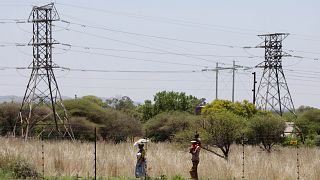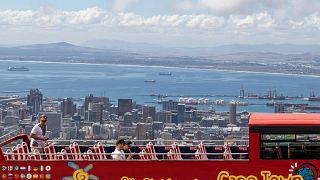South Africa
Many South Africans spent their Monday morning lining up outside liquor stores, as alcohol sales were allowed again after a two-month ban because of the coronavirus outbreak.
But while South Africa — with the continent’s most developed economy and the highest number of confirmed cases of COVID-19 — relaxed its strict lockdown, the reopening of most school classes was delayed and there was debate about how churches could safely resume services.
The government postponed the planned opening of two grades for another week so that some under-prepared schools could get ready to resume classes for grades 7 and 12, the final years of elementary school and high school.
Places of worship were allowed to open from Monday with limits on the number of people in congregations, yet many religious groups said they would refuse the opportunity.
They said they were concerned about the danger of allowing people to gather in an enclosed building — something health experts warn against — and some also said that limiting the number of people who could come into their church is against their values.
South Africa has reported over 32,000 COVID-19 cases and more than 600 people have died. The government warns that the number of infections will continue to increase and the peak is not expected until August or September.
Still, the relaxation of the alcohol ban came as a relief to many, who chose restocking their liquor cabinets instead of going straight to work on the day much of the country’s economy also reopened.
In the poor township of Macassar, near Cape Town, people left home at 4.30 a.m., residents said, to secure places in lines at liquor stores. The stores were set to open at 9 a.m. for the first time since March 26. Some walked with plastic crates to carry the bottles of beer and wine that they planned to buy.
In the nearby town of Somerset West, socially distanced lines weaved out of the shops, onto sidewalks and into the parking lots of shopping malls.
Cheers rose in a Johannesburg supermarket when screens were removed from wine racks to allow sales to begin. The line of shoppers waiting for wine snaked through the store.
“It’s been a long two months,” said Tony van Schalkwyk, who got to one shop an hour before it was due to open. He said he hoped to get beer, white wine, red wine and brandy — what he referred to as “just basics.”
Shelves of popular brands of alcohol were emptied in two hours at one liquor shop in an affluent suburb of Johannesburg, with only the most expensive products left unsold. Alcohol is only allowed to be sold from Monday to Thursday between 9 a.m. and 5 p.m., under the new relaxed measures.
There were warnings against stockpiling alcohol and some stores placed limits on how much customers could buy. Some customers went to more than one store to restock, aware that the government has cautioned that some areas — referred to as “coronavirus hotspots” — could return to stricter lockdown measures if their rates of infection increase dramatically. That could mean the contentious alcohol ban is re-enforced in some areas, including major cities like Johannesburg and Cape Town.
After delaying an announcement, the education department said that the date for the return of schools nationwide was now June 8. Schools would “prepare for the arrival of learners” from Monday, the department said.
But some schools went ahead and opened as initially planned in Cape Town after the provincial education department there said they were ready. At one high school, pupils lined up to have their temperatures taken with a thermal device and to answer questions before they could enter, part of regulations that will be enforced at all schools.
While the opening of places of worship was welcomed by some, including an opposition party, the African Christian Democratic Party, others said it was too dangerous and they would stay closed.
“This sudden, seemingly rushed move is questionable,” said the Jesuit Institute of South Africa in a statement issued last week.
The government ordered that a maximum of 50 people would be allowed in congregations and that congregants must stand 1.5 meters apart at all times and wash or sanitize hands.
“Evidence of cluster spread in other parts of the world suggests that even in places of worship where strict social distancing rules were upheld there were reports of infection,” the Jesuit Institute said. “The more people mix, the more there is potential for spread. Places of worship are not immune to the virus.”
The Jesuits also questioned how churches, mosques, synagogues and temples could be expected to turn people away if more than 50 wanted to attend a service.
“This is an almost impossible decision to make for religious leaders,” they said. “Will police check places of worship and break up gatherings of more than 50 persons?”













Go to video
Semenya ruling shakes foundations of gender rules in sport
01:53
SMES under pressure as business confidence hits four-year low in South Africa
01:07
30% on South African imports: Ramaphosa hits back at new Trump tariffs
00:59
South Africa, Austria agree to strengthen ties